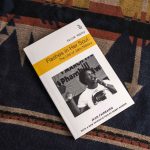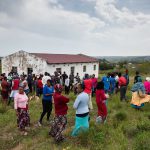Murder is a routine tool of social control
The scale at which grassroots activists, and participants in strikes and protests, have been murdered is a major threat to democracy, a threat which is seldom taken seriously in the elite public sp…
Author:
18 September 2020

Each year, as the anniversary of the murder of Steve Biko in 1977 rolls around, his highest aspiration for the future is widely quoted: “In time, we shall be in a position to bestow on South Africa the greatest possible gift – a more human face.”
His prescient warning about how things could go wrong is quoted less frequently: “This is one country where it would be possible to create a capitalist black society. If whites were intelligent. If the Nationalists were intelligent. And that capitalist black society, black middle class, would be very effective at an important stage … South Africa could succeed to put across to the world a pretty convincing, integrated picture, with still 70% of the population being underdogs.”
Related article:
In 2020, the majority remain excluded and oppressed while elites, black and white, enrich themselves at the direct expense of that majority. In these conditions, the juxtaposition of these two statements by Biko takes on all the power of a blow to the solar plexus. So much was given and so much lost in the struggle for a just society, that the tawdry realities of the present dishonour the dead as much as the living.
One of the many, many people who sacrificed everything for a future that never came was Jabu Ndlovu, a National Union of Metalworkers of South Africa shop steward at the Prestige factory in Pietermaritzburg. Just after midnight on 22 May 1989, Inkatha attacked her home in nearby Imbali. Shots were fired and the house set alight.
Jabu’s husband Jabulani and Khumbu, her elder daughter, were killed by gunfire. Luhle, her younger daughter, and her nephew Thabane suffered burns. Jabu was taken to hospital with a bullet wound in the head and severe burns. After 10 days in agony, during which she was able to name the men who had attacked her home, she died.
Locked out of a decent life
Jean Fairburn’s 1991 biography of Jabu Ndlovu, Flashes in Her Soul, gives a lucid account of the lived experience of political commitment in a place like Imbali during those times.
Reading the book today, it is distressing to see that in many ways, but not all, the account of the life of an activist in Pietermaritzburg in 1989 sounds very much like the experience of grassroots activism in Durban over the past 15 years: phoned-in death threats; phone calls at all hours of the night with no one on the line; late-night phone calls with news of a threat, an attack or a murder; unfamiliar cars following people or parked outside their homes; strange men asking for people or watching their homes, or both; people rushing to get home before the sun sets, or staying over with a comrade if a meeting has run late because it’s not safe to be out after dark; people sleeping in different places every night or heading to rural homes to lie low when things are getting hot; people not being able to sleep and, if they do doze off, waking with a jolt at every sound; attempts to induce or intimidate people to inform on others; the police brazenly on the side of the men doing the killing; the personal cost of it all; the stress on families; political funerals; new songs for new martyrs; comrades taking up the work of looking after the families left behind; the straight-up use of death threats and murder as a form of political control.
Related article:
In 2020, our reality is not just that most people remain locked out of the material means for a decent life. Our reality is also that people who organise themselves to sustain the struggle for justice continue to be met with severe repression, including assassination.
On Monday 14 September, the Daily Maverick published an article presenting research findings that “since 2016, there have been at least 38 assassinations and 14 attempted assassinations in mining localities in KwaZulu-Natal”.
It has long been known that the intersection between traditional authority and multinational mining companies often results in social and ecological devastation that enriches local and international elites and impoverishes the ordinary residents of mining-affected communities. It has also long been understood that the alliances between traditional authority and mining companies frequently results in the intimidation of people holding dissenting views and sometimes, as with the well-known case of Sikhosiphi “Bazooka” Rhadebe in Mbizana in 2016, assassination.
Related article:
But the new research indicating that there have been at least 38 assassinations in mining-affected communities in KwaZulu-Natal since 2016 is staggering. Of course, assassinations are hardly a rare occurrence in KwaZulu-Natal. As early as 2013, it was reported that there had been more than 450 political assassinations in the province since the end of apartheid. Things got a lot worse in the years to come. The bulk of these assassinations have been consequent to intra-ANC conflicts over access to political office and tenders rather than any ideological differences.
But while the report on the study of mining-related assassinations in KwaZulu-Natal does not offer details on the context of each assassination, it seems fair to assume that in at least some instances grassroots opponents of mining have been murdered.
Growing list of murders
Assassinations that target activists working outside of party politics are common. It is well known that shack dwellers’ movement Abahlali baseMjondolo has lost 18 comrades to assassination or random state murder since 2013. A quick Google search, hardly an adequate research tool, throws up the names of at least 20 other activists, including a number of trade unionists, who have been assassinated since 2006.
There is also a continually growing list of people killed by the state during strikes and protests. Well known is that 34 striking miners were massacred at Marikana in 2012. Less well known is the long list of people that police officers and private security guards have murdered on street protests. A search of online media reports, again hardly an exhaustive research process, throws up a number a little north of 75. In many cases, in a telling indictment of the priorities of the elite public sphere, the names of the dead are not given.
It is clear that the social order produced by racial capitalism, and largely sustained by the ANC, as well as strategies for accumulation by new or aspirant elites, are routinely protected by violent repression, including murder. The movement that had won the confidence of millions of people by the late 1980s is now, to a significant degree, a vehicle for a predatory and repressive elite.
Related article:
The failure of the ANC, as well as its partners in the Congress of South African Trade Unions and the South African Communist Party, to adequately name this reality – let alone deal with it effectively – requires the most uncompromising critique that can be mustered and sustained. But it would be bad faith for the moral culpability for this reality to be laid solely at the door of the ANC and its allies.
The stark fact is that there is no political party in Parliament that takes seriously the fact that grassroots activists have been regularly assassinated, almost always without any consequences for their killers, under the rule of a party that still calls itself a national liberation movement, and under a Constitution that commits the country to “a society based on democratic values, social justice and fundamental human rights … in which government is based on the will of the people and every citizen is equally protected by law”.
In the elite public sphere, corruption in and through the state is examined relentlessly, down to its most mundane details, and condemned in the strongest moral terms. But unless a grassroots activist gunned down in a shack settlement or rural village had some relationship with a well-connected non-governmental organisation, or is part of a popular movement that has been able to sustain self-organisation to the point at which it has won some access to the elite public sphere, their death may well pass entirely unnoticed in this sphere.
Democracy is not just about electoral politics. It is also about day to day forms of political organisation, mobilisation and contestation. If we are serious about democratic ideals it is vital that the routine forms of repression confronted by grassroots activists, including assassination and police murder, be treated as a matter of the utmost seriousness.




